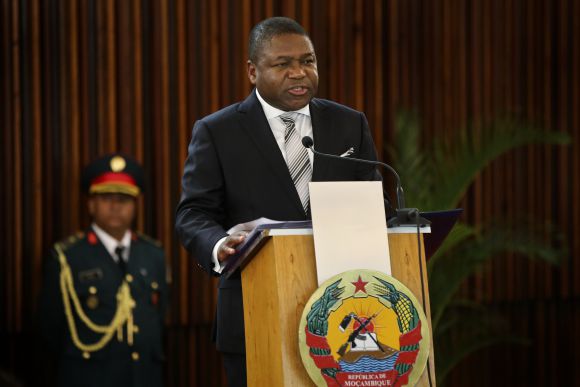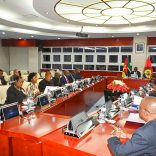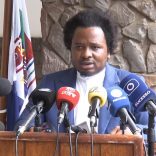Mozambique: Chapo asks Frelimo for "strategies" as elections "have already passed and we are ...
President Nyusi says rising public debt is destabilizing the state

Lusa (File photo) / President of Mozambique, Filipe Nyusi
Mozambican President Filipe Nyusi admits that the increase in public debt is destabilizing the functioning of the state, and reiterates that the authorities are fully committed to clarifying the situation.
“Whether we like it or not, the growth of our debt is destabilizing our normal functioning,” Nyusi said in the press conference that marked the closing of the ‘open presidency’ visit to Maputo at the weekend.
According to head of the Mozambican state, the executive, in tandem with the International Monetary Fund and the Attorney General’s Office, is committed to clarifying the circumstances in which the previous government contracted hefty debts not disclosed to the National Assembly of the Republic (parliament) or international financial institutions between 2013 and 2014.
“We have to admit that it is a problem that must be faced by the executive and we are committed, together the International Monetary Fund, the Attorney General’s Office, parliament and other bodies, to clarifying and correcting what went wrong” President Nyusi said.
In order to mitigate the impact of high public debt, the Mozambican state is to restructure 20 public companies, the president added.
“It is a restructuring or a re-evaluation of the existence [of public state companies]. Recently, we spoke about Airports of Mozambique, which is a viable company, but we noticed they have too much fat and so we have to do some restructuring, including involving the private sector in management,” he said.
The Mozambican government in April acknowledged the existence of a previously undisclosed debts of US$1.4 billion (EUR 1.25 billion), which it justified on national security grounds. The revelation of government-guaranteed loans contracted between 2013 and 2014 led the International Monetary Fund to suspend the second installment of a pre-agreed loan to Mozambique and cancel a visit to Maputo.
The director general of the IMF, Christine Lagarde, said that the suspension of funding that the institution provided to Mozambique was justified by clear signs of corruption.
“When we see a country under an IMF program, where there is international community money involved, which does not fulfill its commitment to financial reporting, which is clearly hiding corruption, we suspend the program. We did this recently with Mozambique” Lagarde said in an interview with the BBC Woman’s Hour program.
The G14 group of state budget donors also suspended its payments, followed by the US, which announced that it would review its bilateral support to the country.
Including the recently disclosed loans, Mozambique’s public debt now stands at US$11.66 billion (EUR10.1 billion), of which US$9,890 million (EUR8.6 billion) is external. This represents over 70 percent of gross domestic product, up from 2012 figures of 42 percent.













Leave a Reply
Be the First to Comment!
You must be logged in to post a comment.
You must be logged in to post a comment.